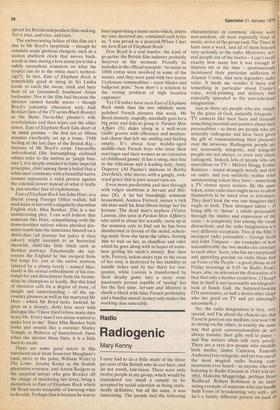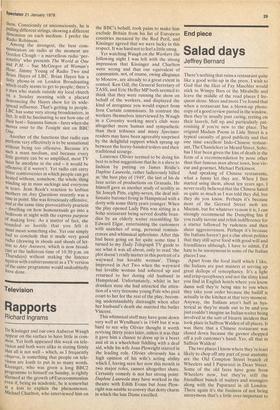Radio
Radiogenic
Mary Kenny
I once had to do a little study of the three per cent of the British who do not have, and do not watch, television. There were only twelve people in my group, which would be considered too small a sample to be accepted by social scientists as being statistically definitive, but all the same, it was interesting. The people had the following characteristics in common: eleven were non-smokers, all were especially fond of music, seven of the group took The Times at least once a week, and all of them listened very seriously to the radio. Moreover, several people out of the twelve I can't recall exactly how many but it was enough to impress me at the time spontaneously mentioned their particular addiction to Alastair Cooke, that now, legendary radio voice. It made me wonder if there was something in particular about Cooke's voice, word-painting and delivery that especially appealed to the non-televisual imagination.
Just as there are people who are, simply by the grace of God, naturally telegenic TV cameras like their faces and transmit something essential and positive about their personalities so there are people who are naturally radiogenic and have been given the gift of communicating their presence over the airwaves. Radiogenic people are not necessarily telegenic, and telegenic people are not always, or even very often, radiogenic. Indeed, lots of people who are marvellous on TV Melvyn Bragg, Esther Rantzen sound strangely weedy and thin on radio, and you suddenly realise what uninteresting voices they have something a TV viewer never notices. By the same token, some radio stars ought never to allow themselves to be lured over to television. They don't look the way one imagines they ought to look. Their strongest talent of being able to 'throw' a whole personality through the timbre and expression of the voice is completely lost among the visual distractions; and the radio imagination is a very different receptacle. Two of the BBC's strongest radio journalists George Scott and John Timpson are examples of how uncomfortably the two media can correlate to each other. Scott, who has an exceptional and appealing gravitas on radio (hear him on Voice of the People a good phone-in on Friday mornings at 9.05 on Radio Four), bears, alas, on television the distraction of a face that only a mother could love. (Though that in itself is not necessarily un-telegenic; look at Sandy Gall, the battered-looking ITN newscaster, or half a dozen other chaps who are good on TV and yet amazinglY uncosmetic.) No: the radio imagination is very, very special, and I'm afraid the chances are that if you're good on one medium, you won't be as strong on the other; in exactly the same way that great conversationalists do not always transfer their gifts well to paper and fine writers often talk very poorly. There are a very few people who straddle both media; James Cameron, Eamonn Andrews (very telegenic, and yet was one of the most magical radio boxing commentators ever heard as anyone who was listening to Radio Eireann in 1948 will testify), Malcolm Muggeridge, perhaps Brian Redhead. Robert Robinson is an interesting example of someone who can handle both forms of broadcasting very well yet he's a faintly different person on each 0f
them. Consciously or unconsciously, he is Pulling different strings, showing a different dimension on each medium. I prefer the Radio Robinson.
Among the strongest, the best communicators on radio at the moment are Gordon Clough — a marvellous radio 'personality' who presents The World at One and P.M. — Sue McGregor of Woman's Hour, Jimmy Young of Radio Two and Brian Hayes of LBC. Brian Hayes has a daily phone-in on London Broadcasting Which really seems to get to people; there's a man who stands outside my local church On a Sunday morning with a placard denouncing the Hayes show for its wide spread influence. That's getting to people. I-BC has some very strong broadcasters, in fact. It will be fascinating to see how one of their best — Susanna Simon — fares when she Moves over to the Tonight slot on BBC One.
Another of the functions that radio can Perform very effectively is to be sensational Without being too offensive. Because it's sUch a mass medium, and because every little gesture can be so amplified, most TV Must be anodyne in the end — it would be Offensive if it weren't. Yet radio can carry bitter controversies in which people can get heated without, somehow, the whole thing Winding up in mass sackings and everyone In tears. Jean Rook's reaction to lesbian Mothers on Any Questions recently was a case in point. She was ferociously offensive, and at the same time provocatively prurient
s. dwelling on how homosexuals go into a
bedroom at night with the express purpose of making love. As a matter of fact, she sounded so hostile that you felt it Must mean something else. Yet one simply had to conclude that it made very good radio (drawing in shoals and shoals of letters to Any Answers, which is now broad
cast at the ludicrous time of 10.30 p.m. on Thursdays) without making the listener Squirm with embarrassment as a TV version of the same programme would undoubtedly have done.



































 Previous page
Previous page